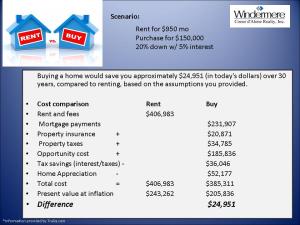You might be surprised to find that a careful Cost/Benefit Analysis still favors BUYING, despite increasing interest rates. Here’s one scenario:
What Does Opportunity Cost Mean?
Here is a great explanation we found at www.investopedia.com:
1. The cost of an alternative that must be forgone in order to pursue a certain action. Put another way, the benefits you could have received by taking an alternative action.2. The difference in return between a chosen investment and one that is necessarily passed up. Say you invest in a stock and it returns a paltry 2% over the year. In placing your money in the stock, you gave up the opportunity of another investment – say, a risk-free government bond yielding 6%. In this situation, your opportunity costs are 4% (6% – 2%).Investopedia explains Opportunity Cost
1. The opportunity cost of going to college is the moneyyou would have earned if you worked instead. On the one hand, you lose four years of salary while getting your degree; on the other hand, you hope to earn more during your career, thanks to your education, to offset the lost wages.Here’s another example: if a gardener decides to grow carrots, his or her opportunity cost is the alternative crop that might have been grown instead (potatoes, tomatoes, pumpkins, etc.).In both cases, a choice between two options must be made. It would be an easy decision if you knew the end outcome; however, the risk that you could achieve greater “benefits” (be they monetary or otherwise) with another option is the opportunity cost.
Of course, we realize that every situation is unique.
We’d love to help you decide if buying is right for you. Let us help you calculate your own Cost/Benefit Analysis.
We’d love to help you decide if buying is right for you. Let us help you calculate your own Cost/Benefit Analysis.
Contact Randy & Christy Oetken for more information!
 Facebook
Facebook
 X
X
 Pinterest
Pinterest
 Copy Link
Copy Link
